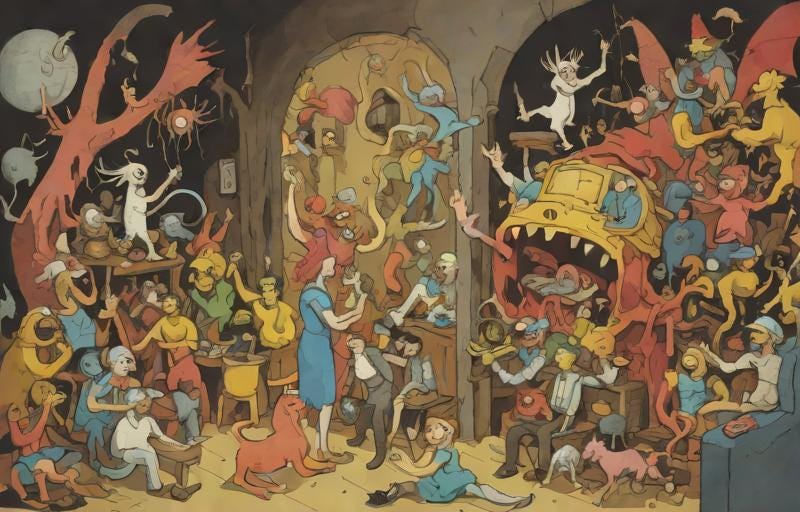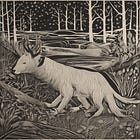Wire-bound words
or, a brief discussion of magnets
Hello dearest reader.
Back when I was a close-up magician1, there was a… how can I put this?… system I used. I cannot describe this system—its mystery must remain enclosed by the rules that so bind that prestidigitative world—but it was a rare and beautiful and complex thing that few bothered to put in the time to learn. I held it close to my heart, cherishing its power, wielding it with a precision befitting the (dare I be so bold?) requisite 10,000 hours. At the time, only a handful of specific books existed on this subject, with one in particular revealing itself to be a complete treatise when first it was published. I clutched that book to my chest each day, hoping I could meld the principles with my skin. It was a thick, beguiling thing, full of humour and crystalline wonder, with a cover as eccentric as its author, a Spanish wizard of unparalleled skill. That author—that master of his craft—solidified my devotion. It was easy to become obsessed.
When I discussed this marvel with other magicians, I felt baffled and elated. Some had never heard of this thing. Some felt it took too much effort. Others derided its use, claiming it was impractical, how it was prone to disaster if a spectator were merely to [redacted]. Well, their loss, my gain. With an arrogance and pride I eventually came to recognise and resent, I walked around knowing I was in on something most weren’t, leaving me with the warm glow of having my own inner circle and secret.
Then, gradually, over the course of a number of years, as my love of magic waxed and waned, the power of this technique spread. It became popular. The system now belonged to the masses2.
But I digress.
I don't want to talk about magic here. All of that was to frame my trepidation of speaking about a work of fiction I have just read. One so powerful and meaningful that there is some part of me that is hesitant to mention it; that if I do then more people3 will be aware of it, that more will read it, that more will proclaim just how off-the-chart bonkers this book is and how, if you’ll excuse my expletive, fucking sensational the words are that are tattooed onto the parchment of each page. There’s a stupid worry that that will happen, that word will spread and the book, powerless, will slide off the oh-god-I-love-you shelf of Literary Fiction and find itself slotted alongside a, urgh, spicy book about dragons and quadrants4. Which is ridiculous, because I want more people to know about this book. I want more people to read it, because reading this book has left me breathless. Reading it, I have slipped between the words, have found myself standing on cream-coloured sands within canyons of towering black ink, each letter the cyclopean wall to a labyrinth of meaning I cannot quite decipher. I have cried at passages. I have wept at the precise arrangement of words and how they sound. I have marvelled at the prose of a genius, the blend of each sentence, the wisps of existential facts that thread through the fiction.
This book has changed my life.
Most of all, though, this book has changed the way I think about writing. Some fleck of its insanity has become lodged in my brain. If there has ever been a book that pushes me, convinces me, that what I really, really want to do with my life is to write, then it is this book. The realisation of that fact has been reinforced by the many strange things that have happened since commencing its reading. In the haze of recent mornings, whilst writing chapters of The Sernox5 and agonising over the choice and placement of each word, proceeding at a rate of about one paragraph per day, I would find, upon turning to this book, that there, right there on the page I was about to read, was the specific and abstruse word I had just written, lingering as though it knew I was coming. Even at work, when often the thread of literary creativity remains hidden, cowering like some timid cat, I would type things out—purine or pyrimidine, the cranial sphenoid or calciferous madrepore, any manner of things I have no business in actually teaching—only to find them staring at me the very second I resumed my reading on the train home. I cannot help but feel that now was when I was meant to read this book. In fact, I am convinced. Last month, I happened to be flicking through a collection of works by Borges—my first foray in sampling his labyrinthine exploration of fiction and reality—delighting in the mystery of “Tlön, Uqbar, Orbis Tertius”, only to read a few days later the following sentence from the book this post is so about:
…and I spent a few days searching for it, going through my books until I found it in the place I had, in fact, first expected, in “Tlön, Uqbar, Orbis Tertius” by Borges.
I felt chills.
This book has infected me with its melancholic tale of what-if, recounting with its terrifying and dream-like passion the autofictional story of an author who never became an author and who lived in the saddest city in the world. I could quote from it without end. Not that I will. Not yet. I only know one other person who has read the book, and that person is Dr. Kathleen Waller. I’ve avoided talking about the specifics here because I want to get some of that in place with Kate first, perhaps as a joint post on Kate’s Substack6, perhaps as something else.
Oh. I realise I haven’t mentioned what this book is. How foolish of me. How silly. Imagine if I left without doing so, if I just closed this post off and sent it out, slipping away to place the book that has changed my life back and unknown beneath my pillow, where it forever will belong.
But that would seem unfair.
So, OK… Fine. Here. Here it is. Place your hand within the wire of its words and feel the current that flows throughout.
A final note to tie things off. This week, I was originally going to continue the little story exchange Terry Freedman and I have on the go. I’m well overdue my return contribution, but it will be penned out for next week, pending any disaster. Sorry, Terry. A minor delay once again.
With that, I shall leave you. May your day be filled with the mountainous wonder if literature.
[“Hyperbole” image credit: Substack Image Generator.]
Unlike the majority of my posts, this is not fiction:
OK look, we’re talking magicians here, so “masses” means a few hundred people.
OK look, we’re talking SLAKE here, so “more people” means a few hundred people.
I’m being a jerk. I’m sure it’s a ripping read.
The first draft, from start to finish, is complete. It begins here:









I have the Solenoid audiobook, does that count? 😅 Haven't listened, though. Backlog! Books can be magical, and you built up such high expectations, t'is dangerous! ;)
Did you read Albert Camus?